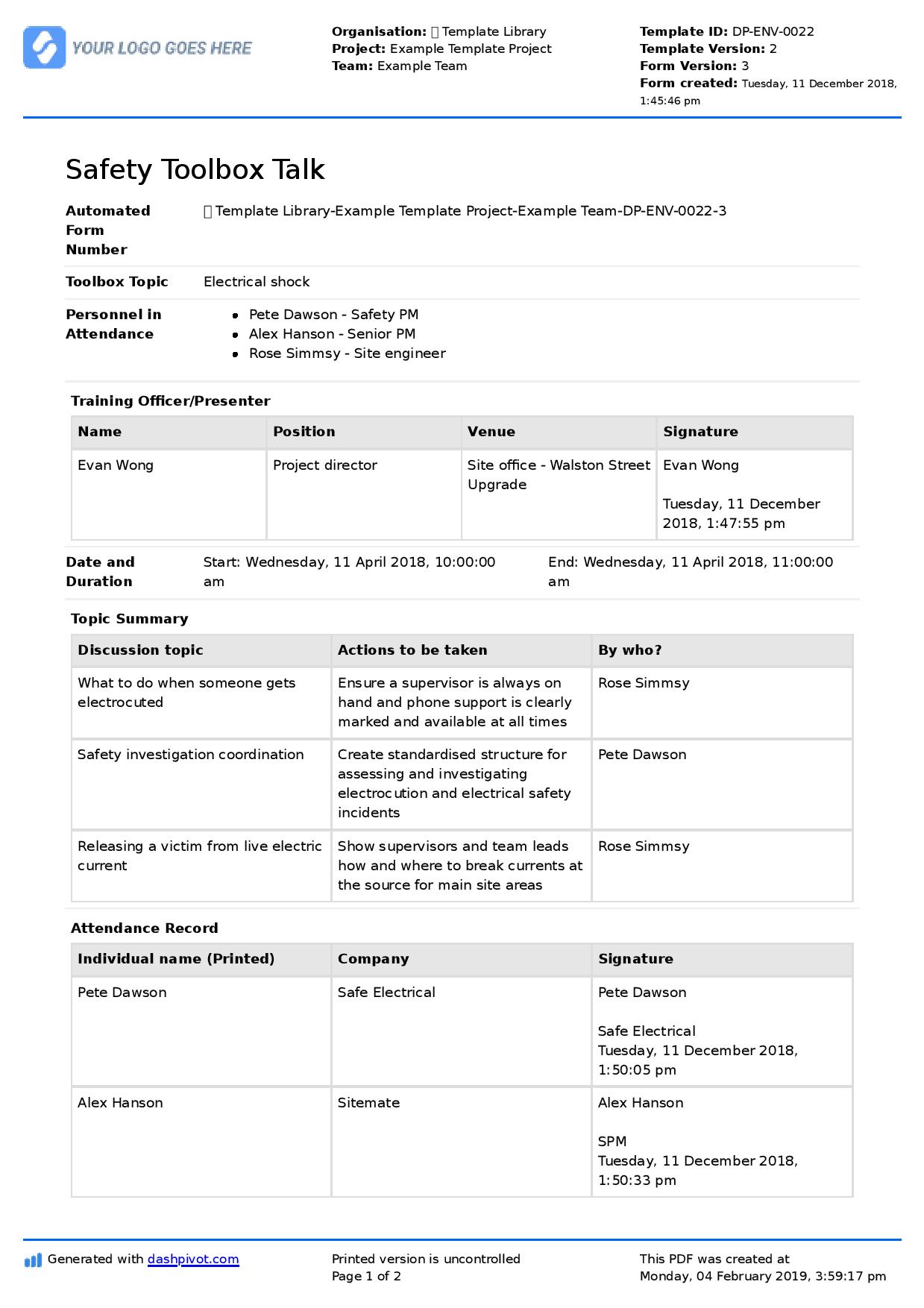Dashpivot article – Are toolbox talks a legal requirement

Are toolbox talks a legal requirement?
Are you legally required to run Toolbox talks?
Toolbox talks, or tailgate meetings depending on where you are in the world, have different needs and requirements depending on the industry you're in and jurisdiction you're working in.
In many places and industries, while the specific format of a toolbox talk might not be a direct requirement, there are often regulations that mandate regular safety communication, training, and consultation with workers.
Toolbox talks often serve as a method to address those safety requirements while not being legally required themselves.
So in short, are toolbox talks a legal requirement? No they are not, but they are directly tied to safety compliance requirements, which is why you should read on, and conduct regular toolbox talks.
How can you use Toolbox Talks to stay legally compliant?
Staying safety (and legally) compliant with toolbox talks means including them as a consistent, ordered part of the safety and health programme of your company. Here is a guideline to help you conduct toolbox for regulatory compliance
Understand the relationship between toolbox talks and legal requirements
Regulatory requirements often outline the necessary safety measures and controls that an organisation must comply with to keep work areas safe. While regulatory bodies don't necessarily require toolbox talks, they do, however, require training. In a way, toolbox talks are training that helps employees retain the correct safety steps when doing a job. An organisation should study and get familiar with their territory regulations so that they can provide a clear outline in their toolbox talks. With this knowledge, your Toolbox talks are more specific and target the discussion on critical points that align with territorial regulations.
Frequent Schedules
Having constant Toolbox talks can really help an organisation to comply with regulations, since the compiled documents of these talks will serve as solid proof that the organisation is keeping up with the standards in training. For regions, states, nations, or territories whose safety regulatory bodies require companies and organisations to have regular toolbox talks, this will provide the regulatory bodies with an easier audit of your files since scheduled toolbox talks are more consistent and organised. Another benefit of this is increasing worker engagement. Having frequent toolbox talks provides a platform where employees can always ask questions or constantly relearn or teach the proper safety metrics of each activity they do. Having said this, their skills will also develop and enhance a keen eye for detail, especially when it comes to safety.
Relevant Topics are Focused
In toolbox talks, relevant topics to the operational process, maintenance procedures, and emergency response will always be highlighted. It should cater to discussing selected topics in a specific work environment an employee goes to. For instance, a carpenter will consistently participate in a toolbox talk that covers topics such as the safety of hand tools, the do's and don'ts when working with a mechanical saw, and safety practices in construction. This inclusivity in the topics will create an impact to foster the safety culture in a specific area where a specific job is being done. Although it is not a limit for workers to just learn from the toolbox talks from the specific fields they do, they are always allowed to learn from other topics that are found in the workfield but not a part of their scope. This will improve the network of safety-minded individuals and responsible workers in an organisation, which could result in good regulatory compliance.
Documentation
Documentation is often a legal requirement when it comes to anything safety related, which means if you are required to run toolbox talks, you should see storing record of these talks as a legal requirement.
Documenting the toolbox talk is the solid proof that a toolbox talk was conducted. This is a crucial step that organisations must do in order to prove during audits that you conducted toolbox talks. It is also important that the contents in this toolbox talk document should be structured in a manner where the topic during the talk is highlighted, the specifics of the procedure of the activity or process that will be done, the safety measure that needs to be in place before, during, and after the activity, and the workers who confirmed that they have understood the topic and will practice it in the field. These contents should be detailed, as this is crucial in the document to be audited, especially in those places where it is a regulatory requirement.
Feedback Loop
Constantly talking about the safety measures during the toolbox talks creates a safe space where workers can open up questions, voice out some of their concerns, and share an idea about a better and safer procedure. These things can be officially documented in toolbox talks to further enhance safety practices in the organisation. These will also look good in the eyes of auditors since you are further improving safety measures in the company. This just goes to say that this will keep organisations legally compliant.
Updated Training Materials
Regulatory bodies are not static with the regulations and rules about the proper safety procedures because they are also constantly updating them to further enhance and change obsolete procedures to improve workplace safety. One way of getting your employees and workers updated about these is through toolbox talks. These are essential to be imparted to workers, especially when the change is applicable to the type of procedures your workers might be doing. When they are aware, they can practice the new procedure, get used to doing it, and try and master it. Having said this, your company can stay compliant with the regulations.
Address Accidents and Near Misses, which are always related to the legal side of safety
Since toolbox talks are an avenue for educating your workers, recent accidents and near-misses are highly recommended to be discussed during these informal meetings. These will be the perfect chance to discuss what happened during the accident or near miss. It could detail the part of the procedure that led to the accident or near miss. This will further reinforce the workers understanding of why they need to follow the correct safety procedure. If however the current procedure was practiced and still the accident or nearmiss occurred, the toolbox meeting can also be a discussion on what proper safety metric should be recommended in order to avoid such unwanted events.These can then be documented to strengthen the safety measures and stay legally compliant.
Incorporate Expertise
Toolbox talks can be held by anyone. They are effective, especially if the experts in certain fields preside over the discussion of the procedures and processes. Having an open meeting like this provides more detailed topics when an expert is explaining to the team how to go about things in certain activities. Discussions would be more detailed, missing none of those crucial safety steps that one must take note of. This also boosts the morale of your workers. Giving them the opportunity to speak and teach the group develops their communication skills and leadership abilities. Recognising them as experts gives them a sense that they are dependable, further executing exemplary work.
Use Real-world Examples
For areas where toolbox talks are legal requirements, some real-world examples of where there was non-compliance with the regulations are recommended to be cited during these informal meetings. This could help workers understand the consequences of non-compliance and make them aware of their responsibilities to maintain the safety measures that adhere to the legal requirements of the territory.
Engage All Levels of Personnel
Toolbox talks are for everybody. No one should be excluded from attending these informal meetings. Managers, contractors, subcontractors, rank and files, and everybody involved in a certain project or activity are allowed to listen, teach, or share during toolbox talks. This strengthens the relationship of the team and forms a rigid camaraderie. A team with a good relationship has great teamwork. Everybody would always be helping out somebody. Having great relationships would also mean people would care for one another and look out for each other. This can really help in keeping everybody safe during activities.
How should you document your toolbox talks for legal purposes?
As we already said when discussing whether toolbox talks are a legal requirement, documenting how you have covered critical safety processes is usually the most important aspect of remaining safety compliant, because the documentation drives the processes.
Documenting toolbox talks is crucial not only for keeping a record of the topics discussed and ensuring that all workers have received relevant information but also for demonstrating compliance with safety regulations if needed.
Below is an example of a safety toolbox talk to give you an idea of how to document your meetings, or you can read more about toolbox talk examples here.

Use and customise this toolbox talk document for free
Make documenting your toolbox talks easier, so you can always prove your processes for legal requirements
Use or customise this free toolbox talk template to ensure you're properly documenting your toolbox talks and make running them smooth and efficient.
With sections for talking points, attendance, feedback, and signatures, you have the information you need to conduct the talk and the documentation to review your compliance in case of an audit.
Add PDFs for legislation changes to ensure your team is aware of changes to how they do work or the output of what they're working on, which makes meeting legal requirements across the whole team more likely.

Customisable toolbox talk content
Organise your toolboxes more efficiently for legal purposes.

Slips, trips and falls
Focus on one of the biggest hazards around legal issues being slips, trips and falls.

Ladder safety
Run toolboxes on another of the most frequent hazards which results in legal issues - ladders.